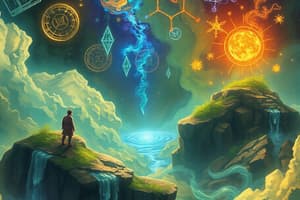Podcast
Questions and Answers
What is the primary focus of natural sciences?
What is the primary focus of natural sciences?
- Study of human behavior
- Exploration of abstract concepts
- Understanding the physical world and its phenomena (correct)
- Analysis of data and results
What is the first step in the scientific method?
What is the first step in the scientific method?
- Hypothesis
- Observation (correct)
- Conclusion
- Question
Which of the following best describes a theory in science?
Which of the following best describes a theory in science?
- A universally accepted truth
- A rule that governs specific occurrences
- A well-substantiated explanation of a natural phenomenon (correct)
- An untested idea or guess
What role do controlled variables play in an experiment?
What role do controlled variables play in an experiment?
What is a current trend in science concerning research methodologies?
What is a current trend in science concerning research methodologies?
Flashcards are hidden until you start studying
Study Notes
Definition of Science
- Systematic enterprise of gathering knowledge about the world.
- Utilizes observation, experimentation, and reasoning.
Major Branches of Science
-
Natural Sciences
- Focus on the physical world and its phenomena.
- Examples: Physics, Chemistry, Biology, Earth Science.
-
Formal Sciences
- Study abstract concepts and structures.
- Examples: Mathematics, Logic, Statistics.
-
Social Sciences
- Explore human behavior and societies.
- Examples: Psychology, Sociology, Economics.
Scientific Method
-
Observation
- Gathering data about phenomena.
-
Question
- Formulating questions based on observations.
-
Hypothesis
- Proposing explanations that can be tested.
-
Experimentation
- Conducting tests to validate or invalidate the hypothesis.
-
Analysis
- Interpreting data and results.
-
Conclusion
- Drawing conclusions based on analysis; revising hypotheses if necessary.
-
Replication
- Ensuring results are repeatable by others to confirm findings.
Importance of Science
- Provides explanations for natural phenomena.
- Drives technological advancements.
- Informs policy decisions based on factual evidence.
- Essential for critical thinking and problem-solving skills.
Key Concepts
- Theory: A well-substantiated explanation of some aspect of the natural world.
- Law: A statement based on repeated experimental observations that describe some aspects of the universe.
- Variables:
- Independent: manipulated by the experimenter.
- Dependent: measured or observed during an experiment.
- Controlled: kept constant to ensure fair testing.
Current Trends in Science
- Interdisciplinary research (e.g., bioinformatics, environmental science).
- Use of technology and data analysis (AI, machine learning).
- Increased focus on sustainability and ethical implications.
Definition of Science
- Science is a systematic process of gathering knowledge about the world.
- It relies on observation, experimentation, and reasoning.
Major Branches of Science
- Natural Sciences study the physical world and its phenomena.
- Examples include Physics, Chemistry, Biology, and Earth Science.
- Formal Sciences explore abstract concepts and structures.
- Examples include Mathematics, Logic, and Statistics.
- Social Sciences investigate human behavior and societies.
- Examples include Psychology, Sociology, and Economics.
Scientific Method
- The scientific method is a structured approach for scientific inquiry. It consists of the following steps:
- Observation: Gathering data about a phenomenon.
- Question: Formulating questions based on observations.
- Hypothesis: Proposing testable explanations to answer the questions.
- Experimentation: Conducting experiments to test the hypothesis.
- Analysis: Interpreting data and results from the experiment.
- Conclusion: Drawing conclusions based on analysis. Revise hypothesis if necessary.
- Replication: Repeating experiments to ensure results are consistent and reliable.
Importance of Science
- Science provides explanations for natural phenomena.
- Drives technological advancements, such as new medicines or energy sources.
- Informs policy decisions by providing factual evidence.
- Essential for critical thinking and problem-solving skills.
Key Concepts
- Theory: A well-substantiated explanation of some aspect of the natural world, supported by evidence.
- Law: A statement based on repeated experimental observations that describes some aspects of the natural world.
- Variables:
- Independent variable: Variable manipulated by the experimenter during an experiment.
- Dependent variable: Variable that is measured or observed during an experiment.
- Controlled variable: Variable kept constant to ensure a fair test.
Current Trends in Science
- Interdisciplinary research: Combining different scientific fields, like bio-informatics or environmental science.
- Technology and data analysis: Use of artificial intelligence (AI), machine learning, and big data analysis in research.
- Sustainability and ethics: Increasing focus on environmental sustainability and addressing the ethical implications of scientific discoveries.
Studying That Suits You
Use AI to generate personalized quizzes and flashcards to suit your learning preferences.




